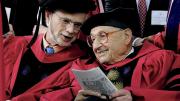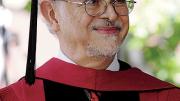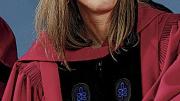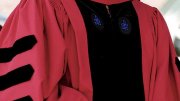Six men and two women received honorary degrees at Commencement. University provost Alan M. Garber, in this role for the first time (he took office last September 1), introduced the honorands, and President Drew Faust read the citations, concluding with the recipient’s name and degree. For fuller background on each, see harvardmag.com/2012-honorands.
Mario Molina. Co-winner of the 1995 Nobel Prize in chemistry for work on the atmospheric ozone layer and its depletion by manmade chlorofluorocarbon gases, now Distinguished Professor of chemistry and biochemistry at the University of California, San Diego. Doctor of Science: Guarding a sphere that encircles the Earth, committed to the care of the air we breathe, an atmospheric chemist of stratospheric achievement whose work in the lab is a boon to the world.
Dame Gillian Beer. King Edward VII professor of English literature emerita at the University of Cambridge (where she was president of Clare Hall College); a pioneering analyst of the relationship between science and literature in the works of Charles Darwin, George Eliot, Virginia Woolf, and others. Doctor of Letters: A luminous guide to a copious world, forging a missing link between science and literature; for this honor her adroit interdisciplinary transgressions make her a natural selection.
John Adams ’69, A.M. ’72. A distinguished composer of works operatic (Nixon in China, The Death of Klinghoffer, Doctor Atomic) and orchestral (the Pulitzer Prize-winning On the Transmigration of Souls, on the 9/11 victims). Doctor of Music: Daring, eclectic, full of surprise, an American original, Crimson bred, whose music stirs, enchants, provokes, and whose life ennobles the embrace of art.
Walter Kohn, Ph.D. ’48. Co-winner of the 1998 Nobel Prize in chemistry for fundamental contributions to understanding the structure of matter, now professor of physics emeritus and research professor at the University of California, Santa Barbara. Doctor of Science: Elucidating matter’s electronic structure, propelling chemistry’s quantum leap, a sage physicist, a revered mentor, a Nobel laureate who prizes noble aims.
Kwame Anthony Appiah. The moral and political philosopher, and scholar of African and African-American literary and cultural studies, now Rockefeller University Professor of philosophy at Princeton. Doctor of Laws: Brilliant son of Ghana, deep fount of Africana, a philosopher and humanist of discerning moral clarity whose work evokes the spirit of Socrates and the dream of Du Bois.
Wendy Kopp. Founder and chief executive officer of Teach for America, famously conceived as the subject of her senior thesis at Princeton in 1989. Doctor of Laws: Moved by the plight of unprivileged children, relentless in quest of educational ascent, she has marshaled a legion of avid instructors, rousing a generation’s verve to serve.
The Honorable John R. Lewis. The son of sharecroppers, a leading figure in the civil-rights sit-ins, Freedom Rides, and the March on Washington; a victim of police violence at the Pettus Bridge, in Selma, Alabama; and member of Congress from Georgia since election in 1986. Doctor of Laws: His heart full of grace, his eyes on the prize, a heroic figure in a nation’s struggle, meeting fear with courage, animus with amity, violence with dignity and peace.
Fareed R. Zakaria, Ph.D. ’93. Author and journalist who covers and comments on contemporary international affairs, now host of CNN’s Fareed Zakaria GPS and editor at large of Time, and a trustee of Yale, his alma mater. Doctor of Laws: Exploring the future of freedom, expounding the rise of the rest, an incisive intellectual of percipience and vision who shapes debate in the global public square.












